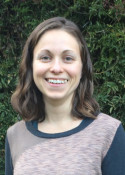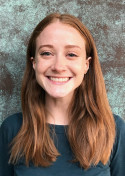WHERE ARE THEY NOW?
Telling the Story
‘Why, to think of it, we’re in the same tale still! It’s going on. Don’t the great tales never end?’ —Samwise Gamgee, in The Two Towers, by J. R. R. Tolkien
All Souls Parish rests in my heart as an anchor, as a still point in the chaotic and changing world in which we live. In my final year at CDSP before heading off in to the wild and wooly Church, All Souls felt like a return to home at its best: the lively community it fosters, the hard work of all who minister, the wonderful music and art: all of these spoke and speak to me of the people of God shining in a darkened world.
My own vocation has taken me overseas, where I am pursuing a D.Phil. in Theology at Oxford. Like the Episcopal Church, the Church of England loves to wring its hands about the future of the institutional church and to worry over declining numbers. However All Souls continues to stand as a sign that even in the West, beautiful, faithful, holy Church can be made. It turns out that the Gospel is always needed, always at work, always alive.
Having gotten here by way of a curacy in Indiana and work as a campus minister at Stanford, my service to God and the the Church has taken the form of study and research and writing. One of the great stumbling blocks I found during my time at Stanford is that for many, many people today, they think that they know what Christianity is about and they (very rightly) don’t want anything to do with it. They think that the Gospel has more to do with who you are supposed to hate than with how you are supposed to serve. Conversations with students for whom the idea of God had become repugnant showed me that the God in whom they (very rightly) refused to believe is also a stranger to me. It is my hope that through my work as a theologian and scholar, I will help open that space and to help such thoughtful and interested people (who nonetheless have few theological tools to hand) see that they are always already engaged in a search for God, if only they could see through the haze.
My work centers on the question: How do we talk about God? I’m getting at that question by way of my oldest and most persistent obsession: stories. Since I was a child I have been fascinated by how stories work and how they work on us. I am studying the ways in which we tell stories in order to encounter the world as meaningful stories like the Gospels, which teach us how to see ourselves and others. Stories like The Lord of the Rings, which former Archbishop of Canterbury Rowan Williams notes provide readers with “a set of imaginative structures in and through which people can think and feel with the same consistency, intelligence and growing wisdom as they did through the stories of Olympus, Troy, Asgard or the Arthurian cycle.” By getting a better handle on how these stories work, on how our myth-making makes us human and brings us into God’s presence, I hope my work will open up conversation about what makes something theology at all? If God is always speaking, perhaps we can find new ways to listen, and in unexpected places.
It has been a bit of a shift, moving from the pastoral theology which I brought to life as a curate and a campus minister into the academic theology which is the shared language of the scholars here at Oxford. However, as an adventure of the heart and of the mind, it has so far proven full of surprises and given me hope for the future of God’s work in the world. Much like Sam Gamgee, we find ourselves, even on the outskirts of the Mordors of our lives, not alone, but living in a great story that includes us and surpasses us. I am so grateful to count All Souls as a companion in my part of that tale.
— Andy Shamel
Our Ministry at Kyakameena Skilled Nursing Facility
 “Where do you see the Realm of God being built up?” Rev. Liz Tichenor asked us during brunch last month. The Spirit’s presence was palpable as people called out responses (see the list in last week’s pathfinder). My mind filled immediately with an image of people gathered in a small room, praying and singing. A few are standing, many are sitting in wheelchairs. Some sing out loud, some smile peacefully as they listen, some are somewhere in between. I saw people receiving communion: eagerly, tentatively; with great hope, and with resignation.
“Where do you see the Realm of God being built up?” Rev. Liz Tichenor asked us during brunch last month. The Spirit’s presence was palpable as people called out responses (see the list in last week’s pathfinder). My mind filled immediately with an image of people gathered in a small room, praying and singing. A few are standing, many are sitting in wheelchairs. Some sing out loud, some smile peacefully as they listen, some are somewhere in between. I saw people receiving communion: eagerly, tentatively; with great hope, and with resignation.
This is what happens each month at our service at Kyakameena nursing home. Truthfully, it is a difficult place to be. Kyakameena is a medicare/medicaid facility, essentially for folks who have nowhere else they can be. They depend on the staff for most, if not all, aspects of daily living and care. And often they are lonely, confused, dejected, or all of the above. Not an enticing invitation, I know.
But here’s the thing: I have witnessed the love of All Soulsians in this place to be a warm ray of peace in the midst of despair. I have seen the needs of the very least, lost, and forgotten of our society being met at least for one hour a month. I have watched as the commitment of this team, often unseen, makes present the Realm of God.
We follow a “script” that closely follows the liturgy of Sunday mornings: a welcome, scripture readings, prayers of the people, the Lord’s prayer, and distribution of communion (from elements consecrated that morning). We sing old, familiar hymns. In that sense, it is not “difficult,” because the shape and text of the service are already laid out for us. While it is not very glamorous, it is a necessary part of living our our calling to seek and serve Christ in all persons. We come as an extension of the community, recognizing these souls as members of our Body, being present with them.
Presence matters. It matters to the residents: being seen rather than forgotten, hearing the Word and participating in Communion. It matters to those who go: recognizing our common identity as children of God and our shared humanity – in whatever physical or mental condition. Your presence matters. We need you if you are willing to pray. We need you if you are willing to sing along. We need you if you are willing to bring a guitar or play piano. We need you if you are willing to sit quietly alongside another.
This ministry does not require a big time commitment: we meet once a month at Kyakameena, gathering at 1:45 for the 2pm service, which typically finishes before 3pm. We will be there a week from this Sunday, November 18, and every third Sunday of the month. Please be in touch if you would like to come see what we do.
Christ’s peace,
Nikky Wood
FROM THE ASSOCIATE FOR MUSIC
 Reclaiming Music?: “Young Cecilia” Series
Reclaiming Music?: “Young Cecilia” Series
On 22 November the Episcopal Church (together with other Anglican, Catholic, and Orthodox traditions) celebrates the feast of St. Cecilia, patron of music, who died in the third century. We are taking this opportunity to invite up-and-coming artists from the ranks of our parish youth to provide prelude music on the Sundays around this date. Beginning this coming Sunday, solo performances before worship will allow our young people to stake a new claim on our musical life.
But in connecting their offerings with St. Cecilia, we (not to mention the wider Church) must also grapple with the gendering of music in European history, which has shaped the construction and meaning of Cecilia’s image, as well as the lives of countless musicians. The stage was set for this even before her lifetime: while the musical pantheons of antiquity consisted of men like Orpheus or David, female musicality was portrayed as inherently dangerous (for details on the latter, look up “siren”).
Contemporary sources provide little witness to Cecilia’s life, but a fifth-century legend told that she refused to consummate her marriage to a pagan man on account of having made a vow of virginity to God, and was martyred after converting her new husband, his brother, and others. Cecilia became identified with music during the early modern period, probably due to an account that she had “sung in her heart to God” while organs played at her wedding: Renaissance artists began to depict her alongside the organ, lute, or other instruments; a music school was named after her in Rome in 1584; and music festivals were organized around her feast day, most famously in England in the decades around 1700.
These were periods in which music was frequently alleged (largely by male writers, of course) to feminize men if not properly approached and managed, and when musical performance by women was said to pose threats of various kinds to social health and well-being (the “siren” phenomenon rehabilitated). But since Cecilia was a woman musician authorized as virtuous by the Church itself—one whose reported virginity had figured into the story of her martyrdom, no less—her image was exploited, often by taking advantage of these intertwined dynamics of gender and virtue. Musicologist Suzanne Aspden has written that the composer George Frederic Handel, in the process of establishing a firmly British cultural identity, aligned himself in one instance with this impeccably Christian Cecilia (her Christian virtue being coded as more British), rather than the pagan musical figure Timotheus (who was coded as foreign).
More broadly, in a 1994 collection entitled Cecilia Reclaimed, musicologists Susan C. Cook and Judy S. Tsou argued that while Cecilian symbolism has been a source of inspiration for feminist scholars, the image of Cecilia has developed by means of the long-standing patriarchal tendency to identify music with femininity (a subject on which scholars have written extensively in the last thirty years). Cook and Tsou proposed that “Cecilia was in many ways the patronized saint of music,” a figure who, by being portrayed as a performer but not as a creator, “presented cultural notions of acceptable female practice; she played the organ, but she did not compose organ symphonies.” Indeed, boundaries of “acceptable female practice” have led to women composers being erased from music history at every turn. And when this division of creative labor into composition and performance has occluded the creative agency of women performers, it, too, has contributed to misogyny in our musical cultures.
Yet, facing the fact that oppressive forces have shaped Cecilia’s image, we can do the opposite of erasing her. We can name those forces, and use the occasion on which we recognize her spiritual patronage as inspiration for a new kind of inclusion in our musical practice, for bringing in interested young people in this different way. If feminist scholars have reclaimed Cecilia by laying bare the ways in which patriarchal systems have molded the meanings of her figure, then our youth might reclaim music by making it with the very attitude for which the Episcopal Church praises the saint (in its publication Holy Women, Holy Men): a passion for glorifying God.
In church these next weeks, you’ll see that passion in action!
— Jamie
Living the Body of Christ
What I appreciate about Christianity and living in the Body of Christ is that we are a faith and collective body of broken people in a broken world who are capable of experiencing redemption, healing, and new life through our Christ and his body that was broken for us. Often within our society, brokenness is associated with worth, and I believe that our faith challenges this facade with the truth in our preciousness as we are made in God’s image.
For two years, my husband, Jason, and I have been blessed to be a part of the All Souls community. Last year, I had the honor of serving as your seminarian. During this time, I learned a great deal of wisdom and training. Three substantial lessons have been the need for rest and self-care as individuals and as a community, how we are called to live as our authentic selves as we are created in God’s image, and relying on our faith community to navigate life. This Fall, I am taking a Leave of Absence from CDSP and my training at All Souls to spend more time focusing on those three needs in my life.
I am one of the millions of Americans, and one of many within our All Souls community, who lives with chronic illness; specifically, a genetic disorder, Ehlers Danlos, and some autoimmune conditions. Although I have been ill my entire life, I was not properly diagnosed and thus properly treated, until the summer prior to coming to seminary. I attempted to navigate my academic studies, spiritual formation and training, and learn to best navigate life with my conditions to the best of my ability but it became quite clear that my efforts were unhealthy and unsustainable. I needed to step back and re-evaluate how to be and what to realistically expect for me to be healthy, productive, and successful.
The purpose of this leave is to give me the time away to be healthy enough to return to CDSP in the Spring with the capacity to be successful in my classes and continued formation. At the time of this writing, my future at CDSP and All Souls has yet to be determined, but I have faith that no matter what, my capacity to serve Christ will remain. More importantly, my worth as a beloved creation of God made in God’s image, has not and will not change. We are merely in another season of discernment of how to live out my call to serve the Church. In life, we do not have control over many realities in our lives but we do maintain power over how we choose to respond. As Christians, we are called and challenged to live in confidence through our faith in Christ rather than anxiety and fear over the unknown. Thomas Merton stated that “Hope is the wedding of two wills, God’s and man’s.” Our hard work within the church and God’s abundant grace enabled the opportunity for Jason and me to come to CDSP and we are trusting that continued devotion, discernment, better focus, and strong work ethic with lead us down the path we are called to travel. My health has improved with the treatments implemented during this leave and we are trusting that it will continue to do so.
So, I am utilizing this leave to work on healing and discern how to better navigate life and answer my call to serve the Church with the reality of my chronic illness. I am prioritizing rest and self care as I adjust to new treatments and learn to better honor and love my brokenness into wholeness. The Twelve Step Community teaches that insanity is repeating the same actions or behaviors and expecting different results. With this perspective, I have treated my time off to be similar to that of an outpatient treatment program and have reevaluated and changed my daily habits, practices, and perspective. One of these efforts is that I took an eight-week Mindfulness Meditation course that focused on stress reduction. This class enabled me to deepen my mindfulness practice of perspective and control over how I choose to respond to and engage in this life. My conditions affect my joints and every organ system within the body and my symptoms are different every day. Mindfulness and this restful time have equipped me with the ability to learn with how to better live with, respond to, and when to appropriately work through how my symptoms affect my life. I also pray the Magnificat and Serenity Prayer several times throughout the day, as they both lead me to better rely upon and worship our life giving Christ.
We are beloved by Christ and are called to love each other in our brokenness. Living authentically in our brokenness is counter to our American culture that perpetuates perfection and productivity. Thankfully, Jesus’ life and teachings offer us a healthy example of how to live counter to an unhealthy and oppressive culture. This leave has gifted me with the opportunity to get to know and live more authentically as a person who lives with illness and disability rather than continue the unintentional facade of one who does not need accommodations. You may have seen me with a cane that I use to help many my diseased joints and chronic pain. This cane has served as the catalyst for many conversations within the All Souls community. Through these conversations, I have learned more intimately of how we are all suffering with our visible and invisible brokenness. The support, prayers, and love that Jason and I have received from our All Souls and CDSP communities has been gracious and generous. However, I wonder where there is greater opportunity for all of us to support one another as the Body of Christ as we navigate this life together with our needs and realities. The first step is to bravely bare our authentic selves and communicate our needs and realties; as we are unable to help and support each other if we are not aware of the crosses that we are all carrying. Better communication is something I am working on and that is the intention of this letter.
At this time, your prayers for me and Jason are most needed and appreciated. I also invite you to please reach out to me if I may support you in your journey of living with illness, disability, or whatever cross you may bear. Thank you for your support in my and Jason’s discernment and call to serve the Church. It is an honor to be a part of this beautiful body that offers Christ’s love and teachings to the world as it does. A body of broken people, sharing the wholeness found in Christ is beautiful indeed.
Peace,
Alison Montgomery Fischer
There is still time…
to make your pledge! Of course there is still time, but if you can do so soon it sure would be helpful to our Finance Committee as they work on next year’s budget! You can mail pledge cards in, drop them in the offering plate, or make your pledge online here. If you need another pledge card, you can find them in the narthex. Thank you!!
Beginning this Sunday
Theodicy: Good God What the Hell is Going On?!
Led by the Revs. Michael Lemaire and Liz Tichenor, meeting at 10:10 am in the Parish Hall, November 11, 18 and 25
If God is all-knowing, all-powerful and all-good, why is there senseless suffering in the world? It’s an age-old question. Countless scores of theologians and philosophers have tackled it, pulled their hair out over it, and striven to create clever acrobatics to get around it. The theological riddle is interesting, but equally so is how we live the questions that follow. How do we live our faith in the midst of suffering? Is suffering an occasion for despair or deeper faith? How do we practice and prepare to live it out? Join us as we dig in, as we look to the stories of those who have tried to live it well before us, and as we try to find the way forward together.
Newcomer Events
If you are new to All Souls, have never been to a newcomer event, or are curious about becoming a member here at All Souls, you are invited to this next round of newcomer events. It’ll all kick off this Sunday, the 11th, with a Meet & Greet with Emily Hansen Curran in her office. Then, on November 18th, we’ll host a Meet & Greet with Phil in his office. Finally, on November 25th, those of you interested in membership are invited to the home of Margaret Sparks after the 11:15 service (1-3p), to meet with Phil, Liz, and Emily for lunch and a brief class on membership here at All Souls. If you have questions about any of these events, please reach out to Emily, emily@allsoulsparish.org.
IN CASE OF EMERGENCY
In order to be prepared for emergencies and disasters, large and small, we ask each parish family to complete an Emergency Form. These forms will be These forms will be available in the Narthex on Sunday. We invite those of you, who have already completed the form a couple of years ago, to check to make sure that there are no changes. We also ask that those of you who have already completed a form, check to make sure that there are no changes. You may also download the Disaster Preparedness Form here, complete and return it to msparks457@aol.com.





